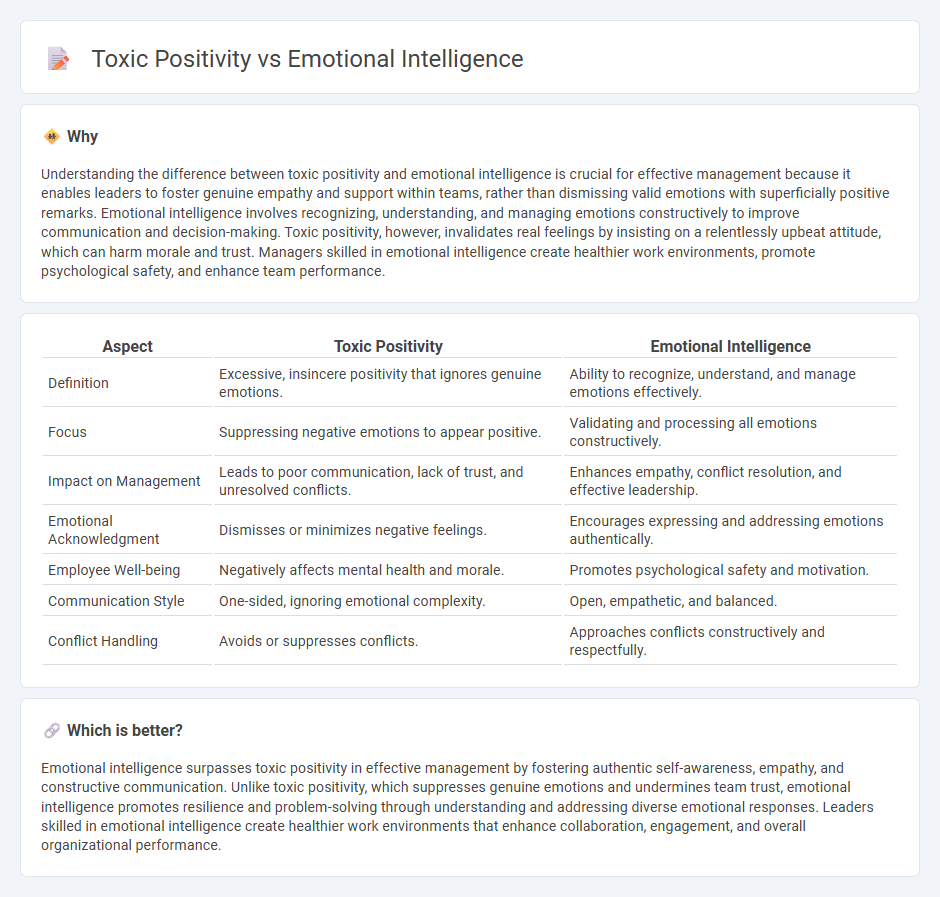
Toxic positivity undermines authentic emotional experiences by promoting relentless optimism while dismissing valid feelings of distress, leading to unresolved issues and diminished mental health. Emotional intelligence, by contrast, emphasizes recognizing, understanding, and managing both positive and negative emotions constructively to foster resilience and interpersonal effectiveness. Explore the key differences and practical applications of these concepts to enhance personal well-being and leadership skills.
Why it is important
Understanding the difference between toxic positivity and emotional intelligence is crucial for effective management because it enables leaders to foster genuine empathy and support within teams, rather than dismissing valid emotions with superficially positive remarks. Emotional intelligence involves recognizing, understanding, and managing emotions constructively to improve communication and decision-making. Toxic positivity, however, invalidates real feelings by insisting on a relentlessly upbeat attitude, which can harm morale and trust. Managers skilled in emotional intelligence create healthier work environments, promote psychological safety, and enhance team performance.
Comparison Table
| Aspect | Toxic Positivity | Emotional Intelligence |
|---|---|---|
| Definition | Excessive, insincere positivity that ignores genuine emotions. | Ability to recognize, understand, and manage emotions effectively. |
| Focus | Suppressing negative emotions to appear positive. | Validating and processing all emotions constructively. |
| Impact on Management | Leads to poor communication, lack of trust, and unresolved conflicts. | Enhances empathy, conflict resolution, and effective leadership. |
| Emotional Acknowledgment | Dismisses or minimizes negative feelings. | Encourages expressing and addressing emotions authentically. |
| Employee Well-being | Negatively affects mental health and morale. | Promotes psychological safety and motivation. |
| Communication Style | One-sided, ignoring emotional complexity. | Open, empathetic, and balanced. |
| Conflict Handling | Avoids or suppresses conflicts. | Approaches conflicts constructively and respectfully. |
Which is better?
Emotional intelligence surpasses toxic positivity in effective management by fostering authentic self-awareness, empathy, and constructive communication. Unlike toxic positivity, which suppresses genuine emotions and undermines team trust, emotional intelligence promotes resilience and problem-solving through understanding and addressing diverse emotional responses. Leaders skilled in emotional intelligence create healthier work environments that enhance collaboration, engagement, and overall organizational performance.
Connection
Toxic positivity undermines emotional intelligence by promoting denial of genuine emotions and discouraging authentic emotional expression. Emotional intelligence requires recognizing, understanding, and managing both positive and negative emotions to foster healthy interpersonal relationships and effective leadership. Managers with high emotional intelligence create environments where employees feel safe to express vulnerability, reducing the harmful impact of toxic positivity.
Key Terms
Self-awareness
Emotional intelligence involves self-awareness, enabling individuals to recognize and understand their true emotions accurately, while toxic positivity promotes ignoring or suppressing negative feelings in favor of forced optimism. Developing self-awareness through emotional intelligence fosters genuine emotional health and balanced responses, contrasting sharply with the dismissive nature of toxic positivity that hinders personal growth. Explore deeper insights on cultivating authentic self-awareness to overcome the pitfalls of toxic positivity.
Authenticity
Emotional intelligence fosters self-awareness and genuine empathy, enabling individuals to recognize and validate their own and others' true emotions, while toxic positivity dismisses authentic feelings by insisting on forced positivity regardless of the situation. Authenticity in emotional intelligence encourages honest emotional expression and connection, preventing the harmful effects of suppressing negative emotions that toxic positivity often promotes. Explore further how cultivating emotional intelligence enhances authentic interactions and emotional resilience.
Psychological safety
Emotional intelligence fosters psychological safety by promoting authentic expression and empathetic understanding, allowing individuals to feel valued and secure in sharing their emotions. Toxic positivity, however, undermines psychological safety by invalidating genuine feelings and pressuring people to maintain a facade of happiness, which can lead to emotional suppression and increased stress. Explore how cultivating emotional intelligence can create genuinely supportive environments that enhance well-being and trust.
Source and External Links
Emotional Intelligence - Wikipedia - Emotional intelligence refers to the ability to perceive, use, understand, manage, and handle emotions effectively.
Spotlight: What it means to be emotionally intelligent | It's Your Yale - This article explores the attributes of emotional intelligence, including self-management and self-awareness.
What is Emotional Intelligence and How Does it Apply to the Workplace? - Emotional intelligence is crucial in the workplace for managing emotions and understanding others, enhancing interpersonal skills.
 dowidth.com
dowidth.com